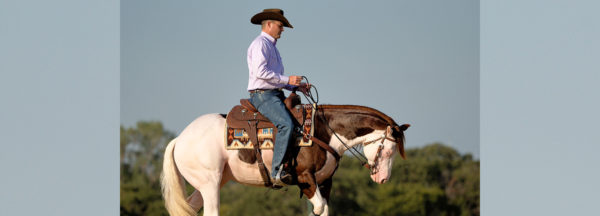Training Tip: Don’t Overextend Your Horse

When you’re working with a horse that is brimming with natural ability you have to constantly remind yourself not to push the horse too much. It’s easy to do. Because the horse is making so much progress and catches on to lessons so quickly, it’s easy to fall into the trap of continuing to ask for a better performance and upping his training. You have to respect the horse’s mental and physical maturity, no matter his ability, or risk ruining his career. While you certainly need to continue advancing any horse’s training, it’s important to keep yourself in check and not overextend the horse and get him into trouble.
That’s the reason why we’ve handled Titan’s career the way we have right from the start. I normally start my 2-year-olds under saddle in January. I didn’t feel like Titan was physically or mentally ready for the experience, so I didn’t start him until June of his 2-year-old year. He quickly caught up to the other 2-year-olds that were started in January and is now physically a monster. He practically breaks the bank in feed bills and is big, strong and stout.
I didn’t show him in the NRHA Futurity because I didn’t feel as if he was quite ready for the show ring. On one hand, it was a hard decision because that was the goal we were working toward, but on the other it was easy because it wasn’t in his best interest. Sure, I could have taken him into the show pen, but there would have been no point to it. All I would have been doing was setting him up to fail.
When I sent Titan to Andrea Fappani to train and show, I knew he’d have Titan’s best interest in mind and take as great of care of him as I did. When he noticed Titan was a little sore, he got him immediate veterinarian attention. At that point, the plan was to show Titan in the Wildcard Reining Challenge in Vegas. Titan could have been shown without a problem, but we made the decision not to for his long-term well-being.
At any of those points in his career, if we would have pushed him, we could have easily ruined him and his career. It’s important to always keep what’s best for your horse at the forefront of your training program, even when it means bruising your ego, falling behind in the timeline you have laid out and not reaching specific goals. It’s fairly easy to do this with the good horses, but when you have your hands on a great one – one that gives you 110 percent and can fool you into thinking they’re invincible and has you dreaming of success, it can be a challenge. Just remember, if you’re patient, you’ll reap the rewards.
